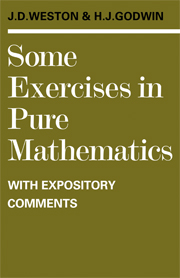1 - An examination syllabus
Published online by Cambridge University Press: 30 March 2010
Summary
ADVANCED LEVEL (ALTERNATIVE SYLLABUS)
The examination will consist of two papers, and an optional Special paper, of 3 hours each. Questions may be set on any part of the syllabus in each of the papers, but a choice of questions will be allowed. The questions will not call for a high degree of ingenuity or for remarkable feats of memory, but candidates will be expected to show an understanding of the nature of mathematical reasoning, and to use symbols intelligently. No question will require the use of mathematical tables, or of any instrument other than a pen.
Syllabus
1. Sets (subsets of a given set): unions, intersections, complements; the empty set; de Morgan's laws; Cartesian products; one-to-one correspondence. Elements of mathematical logic.
2. Fundamental properties of the system of natural numbers (in particular, the commutative, associative, and distributive laws for addition and multiplication). The principle of mathematical induction, and simple applications of this. Scales of notation. Construction of the ring of integers (illustrating the ideas of equivalence class, Abelian group, isomorphism). Divisibility: expression of the highest common factor of m and n in the form rm + sn; Euclida's algorithm. Proof of the existence of infinitely many prime numbers; the sieve of Eratosthenes. Unique decomposition of a natural number into prime factors. Congruences.
- Type
- Chapter
- Information
- Some Exercises in Pure Mathematics with Expository Comments , pp. 108 - 110Publisher: Cambridge University PressPrint publication year: 1968



